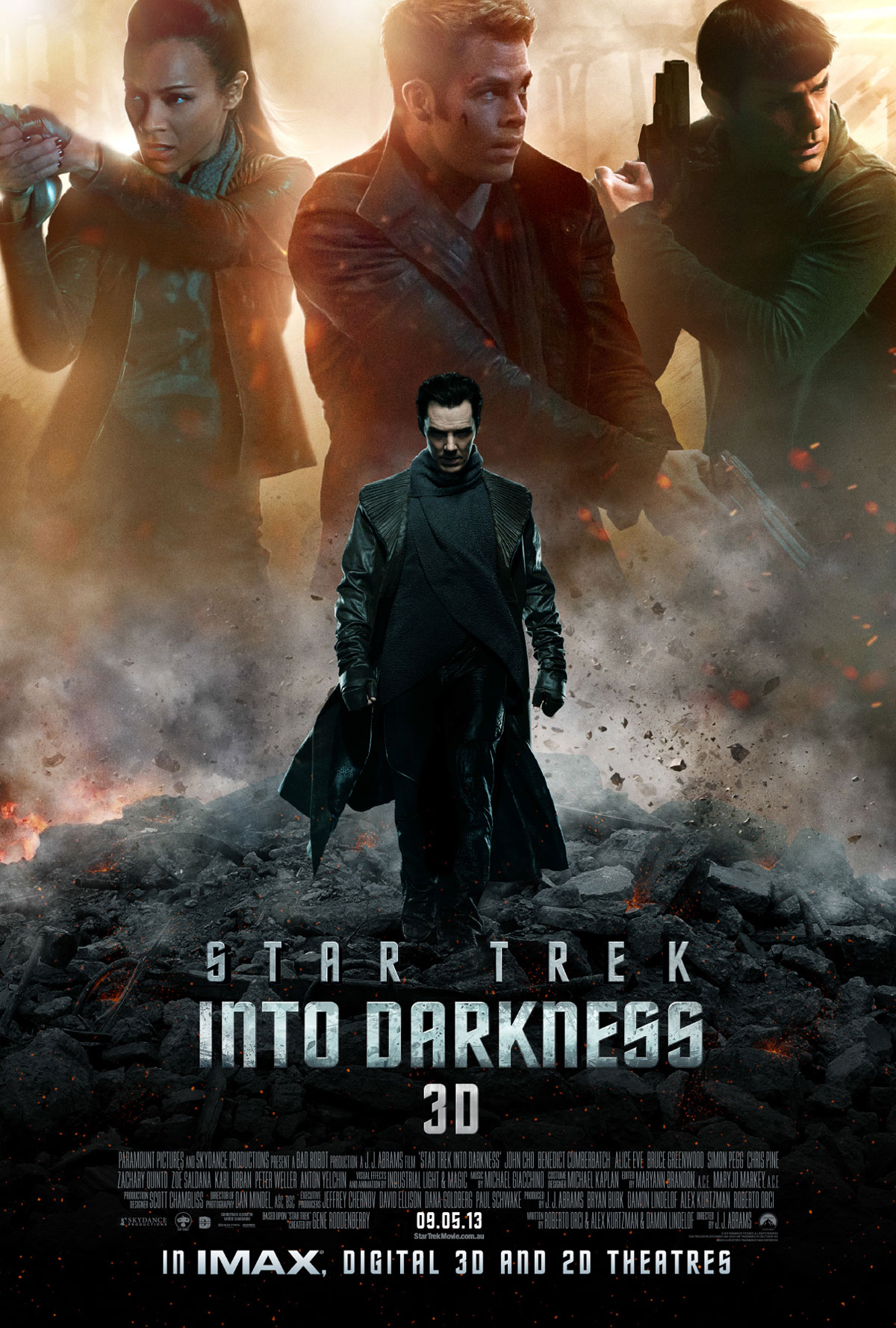Rating: 3 stars (out of 4)
Star Trek: Into Darkness (2013): Dir. J.J. Abrams. Written by: Robert Orci, Alex Kurtzman, and Damon Lindelof. Based upon characters created by Gene Roddenberry. Starring: Chris Pine, Zachary Quinto, Benedict Cumberbatch, Zoe Saldana, and Simon Pegg. Rated PG-13 for intense sequences of sci-fi action and violence. Running time: 132 minutes.
 J.J. Abrams returns with a sequel to the surprise 2009 hit, one which for a multitude of reasons will invite comparisons to the first Star Trek film sequel, The Wrath of Khan. Perish the thought—Into Darkness doesn’t reach those heights, but like the 1982 epic, it does consistently enthrall. Abrams’s Star Trek films feel more like actions films with Star Trek trappings, but they’re filled with enough visual splendor, quirky humor, and homages to whet your appetite for blockbuster sci-fi.
J.J. Abrams returns with a sequel to the surprise 2009 hit, one which for a multitude of reasons will invite comparisons to the first Star Trek film sequel, The Wrath of Khan. Perish the thought—Into Darkness doesn’t reach those heights, but like the 1982 epic, it does consistently enthrall. Abrams’s Star Trek films feel more like actions films with Star Trek trappings, but they’re filled with enough visual splendor, quirky humor, and homages to whet your appetite for blockbuster sci-fi.
The Enterprise crew members are now fully commissioned Star Fleet operatives under the command of James Kirk (Chris Pine). Our heroes might not be rookies anymore, but they still show signs of inexperience—it’s clear Abrams and his writers don’t want to give us the more mature characters from the original series just yet. Pine’s Kirk is ever impetuous and impulsive, with Zachary Quinto’s Spock attempting to balance Vulcan stoicism with human vulnerability. Spock just can’t figure out why Kirk violated direct orders to save his life—something which lands Kirk in big trouble back on Earth.
But Star Fleet has bigger problems—a rogue agent has committed wide-scale destruction against its key institutions. Kirk and his crew are called upon to find the terrorist and neutralize the threat he poses. Soon they find themselves mired in an conflict much greater than their original mission—and much less clear-cut.
Into Darkness finds its strength in testing its characters—heroes, villains, and everyone in between. Screenwriters Orci, Kurtzman, and Lindelof bestow challenging ethical dilemmas upon their characters, who are often forced to choose between immediate and far-reaching consequences. Yet each personality acts in accordance with what they believe to be right. It’s a premise worthy of a Star Trek entity.
An intriguing concept, but what about the execution? Well, it’s not as if Abrams and his writers have forgotten the enormous budget they have at their disposal. This results in supreme spectacle and some inspired action sequences, but it also means the larger ethical questions are pushed into the background. The original show knew its ideas had to guide the show, simply because it couldn’t afford to fall back on effects. Into Darkness can, and does, particularly in the last act.
That said, Abrams keeps the film at a vaulting pace, while allowing his dramatic moments time to breathe. And indeed, he and his team squeeze in some great banter, with Spock and Scotty (a delightful Simon Pegg) getting some of the best lines. And the film benefits from its villain, a mysterious entity named John Harrison (Benedict Cumberbatch). Cumberbatch is fearless as ever, in a film that both harnesses his talents while perhaps underutilizing him in the latter acts. Harrison is revealed to possess deeper motives than “destroy Star Fleet” which prevent him from lapsing into caricature. Cumberbatch nails the character’s intensity while exposing the wounded soul underneath. Alas, what starts as a promising character devolves into a one-dimensional bad guy, one which Cumberbatch nevertheless attacks with fiendish glee—yelling wildly (and needlessly) as he breaks bones and crushes skulls.
As a blockbuster film, Into Darkness gives us a taste of what a modern Star Trek movie can be—gritty, violent, with a hint of philosophic whimsy . I wanted to see more from this material, but I hand it to Abrams—he knows how to engage Trekkies and newbies alike.
–The CineMaverick, 5/22